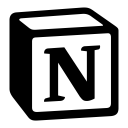Notion vs Asana: How to Choose the Right Tool for Your Business
- 01Notion vs Asana: overview
- 02What's the difference between Notion and Asana?
- 03Notion pros and cons
- 04Asana pros and cons
- 05Notion compared to Asana
- 06Asana compared to Notion
- 07Features comparison
- 08Notion vs Asana: Which is the best for your business?
- 09Promotions on Collaboration software
- 10Alternatives to Notion & Asana
Access up to $6,000 savings on Notion & $2,400 on Asana
Access up to $6,000 savings on Notion & $2,400 on Asana
Effective project and task management are essential to the success of a project, whether it’s a new product launch, digital marketing campaign, or review of an inventory management system. You need a powerful tool to give you oversight of the entire project, keep project documents stored in a central location, and empower team members to collaborate.
That’s where project management apps come in. In this article, we look at two of the leading project management tools on the market—Notion and Asana. We step you through their main features and key differences so you decide which one best suits your budget and business needs.
Notion vs Asana: overview
Notion and Asana are prominent players in the realm of project management software, each offering a diverse array of features. Choosing between these two platforms can pose a challenge, given their extensive capabilities and functionalities.
To facilitate your decision-making process, we've crafted a comprehensive comparison table that highlights the key attributes of Notion and Asana. Utilizing a star-based rating system alongside insightful commentary, this table aims to empower you with the necessary insights to make an informed choice for your project management endeavors.
Whether you prioritize collaborative document creation, task tracking, team communication, or data visualization, our comparison will help you navigate the Notion vs Asana landscape and find the solution that aligns best with your specific business needs.
What's the difference between Notion and Asana?
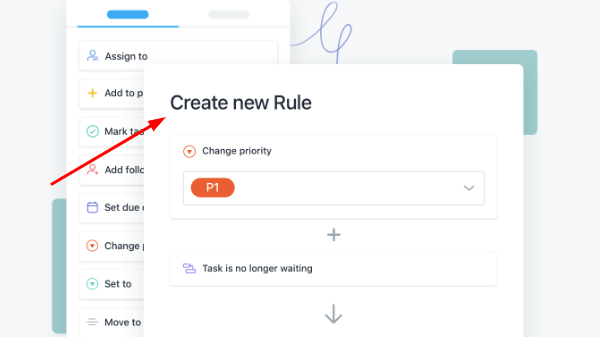

In terms of project management tools, Notion and Asana are both popular choices that have been around for over a decade. With several different use cases, these apps let you assign, track and manage tasks, and collaborate with other team members. They share many central features, but the two tools have some specific differences.
The main difference is their automation functionality. With Asana, you can create simple and complex automation within the app. It lets you set up automated workflows using a rules-based builder to create custom triggers and corresponding actions like assigning tasks or sending notifications. Notion, on the other hand, relies on third-party apps for automation. These may be existing integrations or ones developed and connected via its API. It’s also worth noting that the scope of their AI features varies. Notion AI is primarily a tool to help improve your writing, summarize notes, and scan for important information. The recently launched Asana Intelligence appears to offer broader functionality like goal-based resource management and auto-optimizing workflows. As Asana Intelligence is new, it’s unclear whether it will be automatically provided to existing Asana users or whether an additional subscription is required.
Another significant difference is the apps’ pricing structures, especially their free versions. Asana offers a free plan for individuals or small teams of up to 15 users. This plan appears to give users access to more features than Notion’s. Paid plans then start at $10.99/user/month. Notion also offers a free plan, but only for individual users. Its paid pricing starts at $8/user/month and its AI tool is priced separately. This pricing structure means that Asana may be the more affordable choice for teams of 15 or fewer, whereas Notion could become more affordable for larger groups.
Notion pros and cons
What are the advantages of Notion?
- Versatile all-in-one platform: Notion offers an impressive range of features, including note-taking, task management, document creation, and databases, all within a single platform. This versatility streamlines workflows and reduces the need for multiple tools.
- Customization and flexibility: Users can tailor Notion to their specific needs through customizable templates, layouts, and databases. This adaptability makes it suitable for various use cases, from personal organization to team collaboration.
- Real-time collaboration: Notion allows seamless real-time collaboration, enabling team members to work together on documents, databases, and projects concurrently, fostering productivity and teamwork.
- Rich media integration: Notion supports the inclusion of multimedia content like images, videos, and links, enhancing the visual appeal and usability of documents and pages.
- Cross-platform compatibility: Notion is accessible across multiple devices and platforms, including desktop, web, and mobile apps. This ensures users can stay productive and access their information wherever they are.
What are the disadvantages of Notion?
- Learning curve: While versatile, Notion's wide range of features can lead to a steeper learning curve for new users. Some may find it overwhelming to grasp all functionalities quickly.
- Limited formatting options: Despite its flexibility, Notion has more limited formatting options compared to dedicated document editing tools, which might be a drawback for users who require advanced formatting features.
- Pricey for advanced features: Some advanced features, such as version history and unlimited guests for collaboration, are only available in higher-priced plans, potentially making it less cost-effective for certain users or teams.
- Performance lag: Users with large databases or extensive content might experience performance slowdowns, particularly when loading and navigating through complex pages.
- Offline access limitations: While offline access is possible, it may not be as seamless as desired, which could impact users who rely on Notion in areas with unreliable internet connectivity.
Compare Notion to other tools
Asana pros and cons
What are the advantages of Asana?
- Task management excellence: Asana excels at task management, offering features like task assignment, due dates, priority levels, and dependencies. This enables teams to efficiently plan, organize, and track their work.
- Intuitive interface: Asana boasts a user-friendly and intuitive interface that makes it easy for both individuals and teams to adopt and use effectively.
- Customizable workflows: Asana allows users to customize workflows and project structures to match their specific needs, ensuring a tailored experience for different types of projects.
- Team collaboration: Asana facilitates seamless team collaboration through features like comment threads, file attachments, and real-time updates, promoting clear communication and information sharing.
- Third-party integrations: Asana integrates with numerous other tools and apps, enabling users to connect their work processes and consolidate information from various sources.
What are the disadvantages of Asana?
- Learning curve for complex projects: While user-friendly, Asana's more advanced features and complex project structures might present a learning curve for users handling intricate or multifaceted projects.
- Limited free plan features: Asana's free plan offers basic functionalities, but users looking for advanced features like timeline, forms, and reporting must upgrade to a paid plan.
- Project view overload: In complex workspaces with multiple projects, the project view can become overwhelming, potentially leading to difficulties in navigation and organization.
- Dependency on internet: As a cloud-based tool, Asana relies heavily on an internet connection. Offline access and functionality might be limited or require specific workarounds.
- Notification overload: Users may receive a high volume of notifications and updates, potentially causing distraction or information overload if not managed effectively.
Compare Asana to other tools
Notion compared to Asana
When comparing Notion and Asana, Notion stands out with its versatile and customizable workspace design. Notion offers a flexible and visually appealing platform that allows users to create a wide range of content, from notes and documents to databases and task lists. In contrast, Asana's interface is more task-focused, centered around managing projects, tasks, and team collaboration.
Notion's flexibility and creative potential attract users who prefer a unified platform for various aspects of their work, from project planning to documentation. Conversely, Asana appeals to users seeking a dedicated project management tool with features tailored to task delegation, timeline tracking, and team collaboration.
Is Notion better than Asana?
Deciding between Notion and Asana hinges on your unique requirements. Notion shines in its adaptability for diverse content creation and knowledge management. Its customizable workspace accommodates text, media, databases, and more.
Asana, in contrast, concentrates on systematic project management, aiding teams in assigning tasks, setting deadlines, and monitoring progress. If your emphasis leans toward maintaining an organized workflow and overseeing tasks' lifecycles, Asana might be more fitting. Conversely, if your objectives span creative brainstorming, documentation, and collaborative content development, Notion's versatile capabilities could provide a better solution. Your choice should align with your team's nature and specific project demands.
What is Notion best used for?
Notion stands out as a versatile and multifunctional workspace catering to a wide spectrum of needs. It excels as a note-taking powerhouse, allowing users to jot down thoughts, ideas, and insights seamlessly.
Beyond that, it serves as an effective document collaboration hub, enabling teams to cohesively work on projects in real-time, making edits, and providing feedback effortlessly. Its project planning capabilities facilitate efficient task management and progress tracking, aiding in the successful execution of initiatives.
Whether you're a student managing coursework, a creative team brainstorming concepts, or a company orchestrating complex projects, Notion's adaptable interface adapts to suit your specific use case.
Can Notion replace Asana?
While Notion offers versatile collaboration tools, it may not entirely replicate Asana's intricate project management functionalities.
Notion's flexibility suits smaller teams seeking both task management and knowledge sharing, like a startup coordinating projects and sharing resources. However, if your workflow heavily relies on Asana's specialized features, like Gantt charts for project timelines, extensive integrations, or advanced task tracking, a complete transition might present limitations.
Assess how Notion aligns with your project needs; it could serve as a viable alternative for streamlined collaboration, but complete replacement depends on your specific project management requirements.
Is Notion cheaper than Asana?
When it comes to pricing, Notion presents an attractive option, particularly for smaller teams and individual users aiming to optimize their budget. Notion's pricing structure offers flexibility and affordability, which can be a significant advantage, especially for startups or freelancers looking for a comprehensive workspace without breaking the bank.
Notion’s entry-level plan, Plus, is relatively cheaper compared to Asana’s per month and per user. This cost-effectiveness becomes even more pronounced as your team grows, making Notion an appealing choice for businesses aiming to scale without incurring substantial expenses. By making a cost-conscious decision, you can allocate your resources more efficiently and invest in other aspects of your operations, ultimately contributing to your overall success.
Is there a better Collaboration software than Notion?
Selecting the optimal project management software hinges on a careful evaluation of your unique needs and goals.
While Notion stands out for its adaptable content creation and information organization capabilities, other platforms like Asana, Trello, and Monday.com are tailored to offer a more specialized approach. These alternatives provide dedicated features for structured project planning, task allocation, team coordination, and progress tracking.
Ultimately, your choice should align with your team's specific demands and preferred workflow style to ensure efficient project management.
6 months free on the Plus plan with Unlimited AI on Notion
Get 6 months free on the Plus plan with Unlimited AI on Notion and up to $6,000 savings with Secret.
Asana compared to Notion
When comparing Asana and Notion, Asana stands out with its robust project management capabilities and task-oriented approach. Asana offers a structured platform designed to help teams plan, organize, and execute projects with clear task assignments, deadlines, and progress tracking. In contrast, Notion's interface is more versatile and content-centric, allowing users to create a wide range of content types such as notes, documents, wikis, and databases.
Asana's project-focused orientation makes it an ideal tool for teams seeking efficient project management and task tracking. In contrast, Notion's adaptability appeals to those who want a unified platform for content creation, knowledge management, and collaborative documentation.
Is Asana better than Notion?
Determining whether Asana outperforms Notion relies on your specific objectives. Asana is a powerhouse in project management, offering robust features like task delegation, progress tracking, and team communication. It's particularly valuable for teams seeking a structured approach to streamline workflows and meet deadlines.
Notion, on the other hand, boasts its strength in flexible content creation, note-taking, and collaborative documentation. If your emphasis is on orchestrating tasks and coordinating team efforts, Asana might be your go-to choice. However, if you value versatile content organization and knowledge sharing, Notion could be the ideal fit. Consider your team's unique needs and preferences before making a decision.
What is Asana best used for?
Asana shines as a versatile project management solution tailored for teams striving to optimize their workflows. It serves as a central hub for project planning, task allocation, and progress monitoring. For instance, marketing teams can create campaigns, assign tasks to specific members, and track each step's completion, ensuring seamless coordination. Software development teams can outline coding sprints, allocate bug-fixing tasks, and maintain a clear overview of the development lifecycle.
Whether you're orchestrating complex projects or overseeing routine tasks, Asana provides the structure and tools necessary to keep your team organized, efficient, and on track toward achieving your goals.
Can Asana replace Notion?
Asana excels in focused project management, offering robust task tracking, timeline management, and extensive integrations.
For teams emphasizing precise project organization, like a marketing agency handling campaigns, Asana's structure might better fit. However, if your workflow benefits from Notion's versatility, merging task management with knowledge sharing, such as a content creation team collaborating on articles, a full transition might lack the same holistic experience.
Evaluating the scope of your needs is crucial; Asana offers specialized project management, but replacing Notion depends on your specific project and collaboration requirements.
Is Asana cheaper than Notion?
Asana offers not only competitive pricing plans tailored to different team sizes and needs but also a free plan for those just getting started with project management. This free plan provides access to a range of different features, allowing users to test the platform's capabilities before deciding to scale.
While Asana's pricing may appear higher than Notion's, it's essential to consider the features offered. Asana provides a comprehensive suite of project management tools, including task dependencies, advanced reporting, and integration options. Businesses heavily reliant on such features may find the investment in Asana's plans justified by the increased productivity and streamlined workflows they offer.
Is there a better Collaboration software than Asana?
Selecting the optimal project management software hinges on your unique needs and operational preferences.
While Asana is renowned for its comprehensive features, alternative platforms like Trello, Monday.com, and ClickUp provide their own distinctive strengths.
To make an informed choice, evaluate factors such as project complexity, team collaboration methods, and desired integrations. By aligning your specific requirements with a software's capabilities, you can discover the ideal solution that maximizes productivity and supports your project management endeavors.
6 months free on the Advanced plan on Asana
Get 6 months free on the Advanced plan on Asana and up to $2,400 savings with Secret.
Features comparison
Asana Excels Ahead of Notion with Detailed Reporting

Asana takes the lead over Notion when it comes to detailed reporting capabilities. Asana's reporting tools offer insights into project progress, task completion rates, and team performance.
For instance, marketing teams can generate reports showing the status of different campaigns, helping them identify bottlenecks and optimize resources. Asana's Gantt charts provide a visual representation of project timelines and dependencies, aiding in project planning.
While Notion offers basic reporting features, Asana's comprehensive reporting options provide teams with valuable data-driven insights, making it an excellent choice for those who require in-depth analysis to enhance project management and decision-making processes.
Asana Facilitates Cross-Functional Collaboration Better than Notion

Asana excels in facilitating cross-functional collaboration, making it a preferred choice over Notion for teams that require seamless interaction across departments. Its task dependencies and timeline features enable marketing, design, and development teams to work cohesively on projects. For instance, a product launch involves multiple phases – from design to development to marketing. Asana's interface allows each team to contribute, track progress, and meet deadlines.
While Notion offers collaboration features, Asana's specialized tools ensure that different teams can collaborate effectively, resulting in a smoother workflow and improved outcomes for complex projects that require input from various disciplines.
Asana Has an Advantage Over Notion with its User-Friendly Interface

Asana holds a distinct advantage over Notion when it comes to user-friendliness. Its interface is intuitively designed for efficient project management, making it easy for teams to navigate, collaborate, and stay organized.
For instance, Asana's task boards, timeline views, and kanban boards simplify tracking project progress. Team members can quickly update task statuses, assign responsibilities, and attach relevant files, fostering seamless communication.
While Notion offers a versatile workspace, its interface might be perceived as more complex for those seeking focused project management. Asana's emphasis on user-friendly layouts ensures that even beginners can quickly grasp its functionalities and contribute to project success.
Asana Stands Out with a Wider Range of Third-Party App Integrations
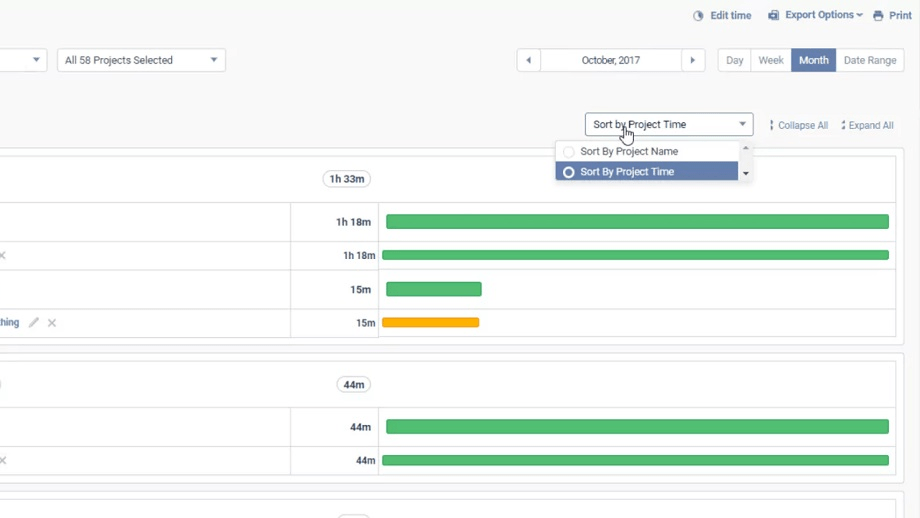
Asana distinguishes itself by offering an extensive array of third-party app integrations, providing a seamless and interconnected workspace. Its integration with tools like Slack, Google Drive, and Microsoft Teams facilitates smooth communication and file sharing.
Additionally, Asana's integration with time-tracking apps such as Toggl or Harvest enhances project tracking and resource management. This versatility streamlines workflows by centralizing essential tools within Asana, eliminating the need for constant switching between applications.
While Notion offers integration capabilities, Asana's broader spectrum ensures enhanced collaboration, task synchronization, and data accessibility, making it a superior choice for those seeking a well-connected project management ecosystem.
Notion is the Best for Efficient Project Management

Notion excels in efficient project management by offering a versatile platform that combines task tracking, documentation, and collaboration. Its ability to create interconnected databases, tables, and notes allows teams to centralize project-related information.
For instance, software development teams can use Notion to outline project specifications, track bugs, and collaborate on code reviews, all within a single workspace. While Asana provides structured project tracking, Notion's flexibility makes it a powerful tool for teams seeking a holistic approach to project management. Its adaptability empowers users to customize workflows, making it a strong contender for agile and creative projects.
Both Notion and Asana Customize Processes Effectively
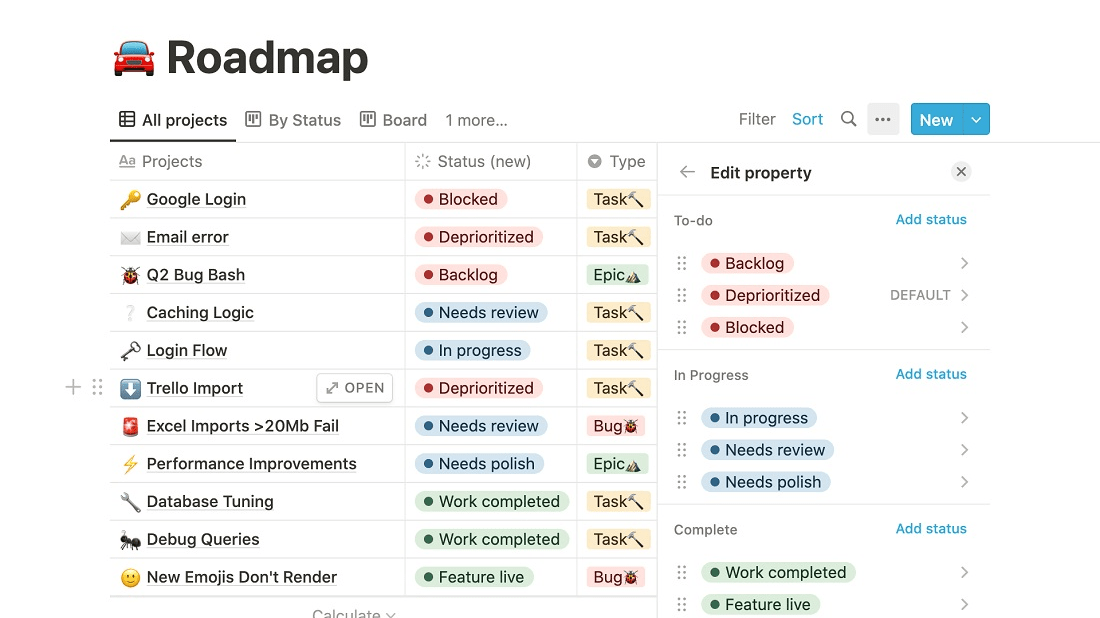
Both Notion and Asana offer effective customization of processes to suit various team needs.
Notion's flexible interface lets you design databases, templates, and workflows that align with your unique project requirements. For instance, marketing teams can create a content calendar database to track campaigns and assets.
Similarly, Asana's custom fields and project templates allow teams to tailor workflows. For software development, a template could include stages like "Backlog," "In Progress," and "Testing."
Both platforms empower teams to adapt their processes, ensuring smoother collaboration, improved productivity, and better alignment with specific project goals.
Asana Better Organizes Work in an Optimal Way than Notion
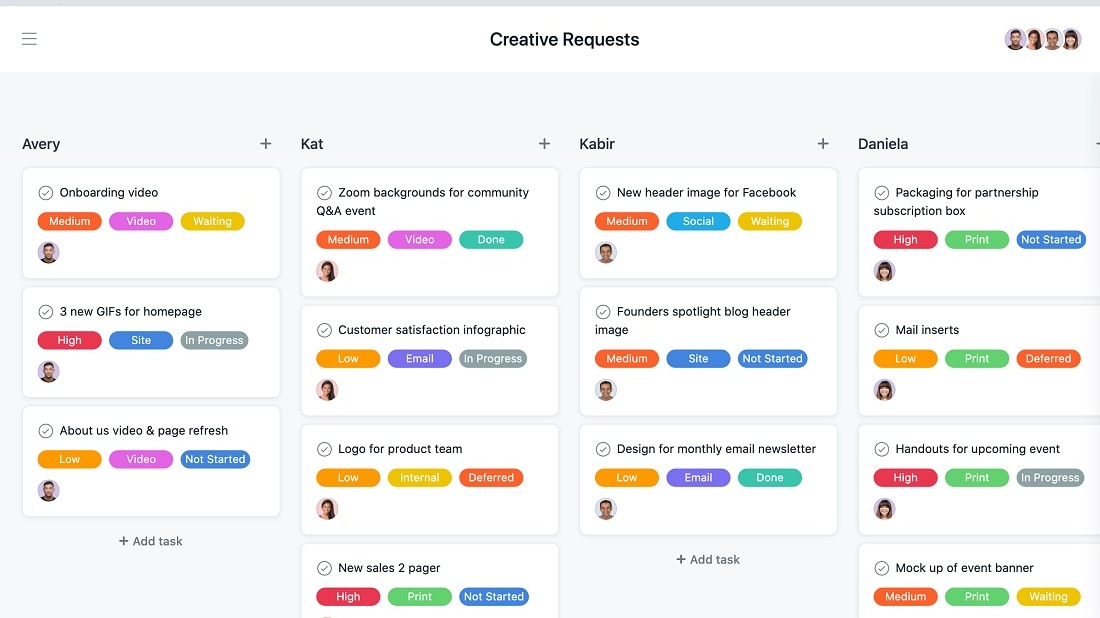
Asana excels in optimizing work organization with its structured project management approach. Its task lists, boards, and timeline views allow teams to break down complex projects into manageable tasks, set dependencies, and track progress.
For instance, marketing teams can outline a campaign's tasks on Asana's boards and assign deadlines, ensuring smooth execution. Notion, while versatile, focuses more on content creation and may lack the structured framework needed for detailed project tracking. Asana's hierarchy and task prioritization streamline workflows, making it a more efficient choice for teams aiming for well-defined processes and clear accountability in their projects.
Subscribe to our newsletters.
No FOMO here. Stay up-to-date on all the latest deals and news with our monthly newsletter straight to your inbox like 126,000+ entrepreneurs (+ Get 10% off on on our Premium Membership!)
Notion vs Asana: Which is the best for your business?
Notion is the best tool for you if:
- You’re looking for a project management tool with a highly versatile workspace design that allows you to organize your content according to your preferences
- Content creation and knowledge management are your priorities and you need a tool that supports brainstorming, document organization, and live collaboration
- You would like access to 24/7 support without paying for the most expensive subscription
- You’re an individual, small, or scaling team looking for a practical yet cost-effective project management solution
- You need a high degree of flexibility to custom-design project tracking and workflows
Asana is the best tool for you if:
- You’re in the market for a robust project management tool with task management, time tracking, and collaboration features
- It’s essential for you to be able to monitor a project’s progress in real-time and track task lifecycles
- You want to structure and optimize workflows across your organization with in-built automation to improve task management and coordination
- A broad range of integrations—such as those with third-party communication, storage, and time-tracking apps—is a key criterion
- You require detailed project analytics for data-driven insights that enable you to identify bottlenecks, address inefficiencies, and streamline workflows
Alternatives to Notion & Asana
Promotions on Collaboration software
Start saving on the best SaaS with Secret.
Secret has already helped tens of thousands of startups save millions on the best SaaS like Notion, Asana & many more. Join Secret now to buy software the smart way.

